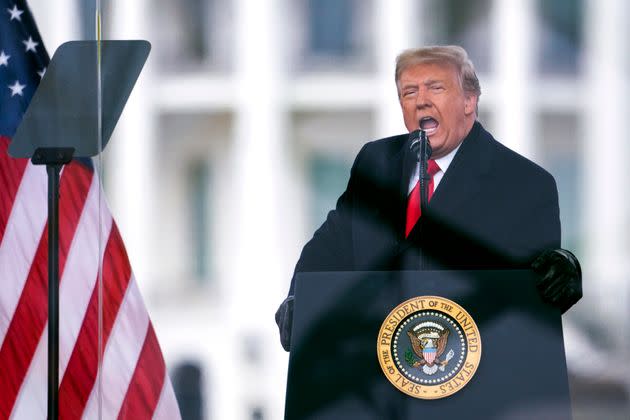‘Bush v. Gore 2.0’: Fears Grow Supreme Court Will Bail Donald Trump Out
WASHINGTON ― The Supreme Court’s decision this week to hear arguments over Donald Trump’s claims for immunity from prosecution is fanning fears that the former president won’t go to trial before the November presidential election and could escape accountability for his efforts to overturn his loss in the last one.
The 6-3 conservative high court could have simply declined Trump’s request for a hearing, letting stand a prior unanimous D.C. appeals court decision that flatly rejected his argument that everything he did related to Jan. 6, 2021 he did as an “official act” as president.
Instead, the justices agreed to take up the case and set oral arguments for April 22 ― a two-month delay that will prevent Trump’s trial from starting in May, as had been previously scheduled. How long the court takes to reach a verdict after that hearing and whether it decides it needs to hear more information from the appeals court could delay the start of Trump’s trial even further.
The delays in the case are starting to add up, unnerving Trump critics who fear that if his federal prosecutions stretch past November’s election and he manages to win another White House term, he could order the Department of Justice to put them on hold or simply dismiss them.
Sen. Sheldon Whitehouse (D-R.I.) called the case “a ginormous self-test” for the Supreme Court, invoking its controversial Bush v. Gore decision that ensured George W. Bush’s victory in the 2000 presidential election over then-Vice President Al Gore.
“If they quickly rule 9-0 that there is not the kind of presidential immunity that Trump asserts, then it will be all to the good,” Whitehouse, a member of the Senate Judiciary Committee, told HuffPost. “If not, then it stands to be Bush v Gore 2.0 with them inserting themselves into a presidential race.”
“Delaying the January 6 trial suppresses critical evidence that Americans deserve to hear,” former Rep. Liz Cheney (R-Wyo.) wrote Friday on X, formerly Twitter. “Donald Trump attempted to overturn an election and seize power. Our justice system must be able to bring him to trial before the next election. SCOTUS should decide this case promptly.”
“The hope of a trial in the Jan 6 case before the election is fading fast. Very fast,” former U.S. attorney and CNN commentator Preet Bharara added.
Of course, the Supreme Court may move more quickly than expected. A ruling affirming the appeals court decision in May, for example, would allow jury selection for Trump’s trial in D.C. to begin sometime in the fall. It’s not clear, however, that a trial would conclude before the Nov. 5 presidential election or even January 2025, when the winner of the 2024 presidential election is due to be sworn in.

The justices also have yet to rule in a separate case seeking to take Trump off the ballot in the state of Colorado due to his efforts to overturn the 2020 presidential election. The oral arguments over that question, which the court is very likely to reject, took place nearly a month ago.
“By not expediting this case, the MAGA Supreme Court once again proves they’re not there to defend the law—they’re there to protect Trump,” Senate Majority Leader Chuck Schumer (D-N.Y.) wrote Friday of the Jan. 6 election subversion case.
“The Court has sped up trials when it wants—but not in this case,” he added.
Trump appointed three justices to the court: Neil Gorsuch, Brett Kavanaugh, and Amy Comey Barrett. Two other justices, Clarence Thomas and Samuel Alito, are also reliable conservative votes who have ruled in his favor in past cases. Thomas has rejected calls to recuse himself in the Jan. 6 case — even though his wife, conservative activist Ginni Thomas, was involved in efforts to overturn the 2020 presidential election results.
Republicans are counting on the court to side with Trump and make the whole thing go away.
“This is an abuse of power and a persecution of President Trump, and I very much hope the Supreme Court puts a stop to it,” Sen. Ted Cruz (R-Texas) said during a NewsNation interview this week.
Trump is charged with conspiring to defraud the United States; obstructing an official proceeding; conspiring to obstruct an official proceeding; and conspiring to deprive millions of Americans the right to have their votes counted. If convicted, he could face decades in prison.
Justice Department special counsel Jack Smith on Thursday proposed a July 8 trial start date in a separate federal criminal case over former President Trump’s handling of classified documents. But the former president’s attorneys argued that “a fair trial cannot be held until after the 2024 Presidential election is concluded.”
However, the DOJ said Friday that Trump’s criminal trials could take place near the election and that they would not be in violation of a rule that prevents the department from engaging in activities that could influence an election 60 days before it takes place.
The government told U.S. District Judge Aileen Cannon, a Trump-appointed judge who is presiding over his classified documents case in Florida, that the rule doesn’t apply to cases that have already been brought.
Arthur Delaney contributed reporting.
CORRECTION: An earlier version of this article referred to Preet Bharara as a former New York district attorney. He is a former U.S. attorney.

